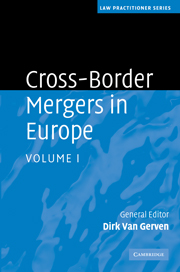Book contents
- Frontmatter
- Contents
- Contributors
- Preface
- Part I EC rules on cross-border mergers
- Part II Application in each Member State National reports for the EU Member States
- 5 Austria
- 6 Belgium
- 7 Bulgaria
- 8 Cyprus
- 9 Czech Republic
- 10 Denmark
- 11 Estonia
- 12 Germany
- 13 Hungary
- 14 The Netherlands
- 15 Poland
- 16 Slovak Republic
- 17 United Kingdom
- Part III Application in the EEA Member States
- Part IV Annexes
- Index
14 - The Netherlands
from Part II - Application in each Member State National reports for the EU Member States
Published online by Cambridge University Press: 03 May 2010
- Frontmatter
- Contents
- Contributors
- Preface
- Part I EC rules on cross-border mergers
- Part II Application in each Member State National reports for the EU Member States
- 5 Austria
- 6 Belgium
- 7 Bulgaria
- 8 Cyprus
- 9 Czech Republic
- 10 Denmark
- 11 Estonia
- 12 Germany
- 13 Hungary
- 14 The Netherlands
- 15 Poland
- 16 Slovak Republic
- 17 United Kingdom
- Part III Application in the EEA Member States
- Part IV Annexes
- Index
Summary
Introduction
Implementation
1. The Cross-border Merger Directive was implemented in the Dutch Civil Code (‘DCC’) with effect from 15 July 2008 by means of an implementing act (the ‘Implementation Act’). Pursuant to the Implementation Act a new chapter 3A, containing provisions which apply specifically to cross-border mergers, was added to Book 2 DCC. In addition, the scope of Art. 2:308 DCC, which lists the Dutch entities that are allowed to enter into a domestic merger, was expanded to allow cross-border mergers between certain entities (see no 3 of this chapter). Thirdly, certain technical amendments were made to two provisions of the DCC on domestic mergers.
Statutory relationship between cross-border mergers and domestic mergers
2. The provisions of the DCC on domestic mergers apply, mutatis mutandis, to cross-border mergers. Although a new chapter on cross-border mergers has been added to Book 2 DCC, a cross-border merger is not considered to be distinct from a domestic merger.
Scope of the new rules
Dutch entities that are allowed to enter into a cross-border merger
3. Cross-border mergers can be entered into by any of the following Dutch entities (Art. 2:308(3) DCC):
(i) a public limited liability company (naamloze vennootschap) (‘NV’);
(ii) a European company (Europese naamloze vennootschap) that has its corporate seat in the Netherlands (‘SE’);
(iii) a private company with limited liability (besloten vennootschap met beperkte aansprakelijkheid) (‘BV’); and
(iv) a European cooperative society (Europese coöperatieve vennootschap) that has its corporate seat in the Netherlands (‘SCE’).
- Type
- Chapter
- Information
- Cross-Border Mergers in Europe , pp. 226 - 256Publisher: Cambridge University PressPrint publication year: 2010
- 1
- Cited by



